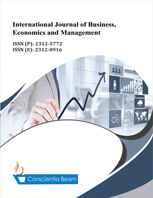Do Derivative Instruments Increase Firm Risk for Indonesia Non-Financial Companies?
DOI:
https://doi.org/10.18488/journal.62.2020.72.81.95Abstract
This study aims to examine the effect of derivative instruments on firm risk. This study employs stock return volatility as total risk and idiosyncratic volatility as unsystematic risk. Derivatives are financial instruments that have a value depending on the underlying value of other variables, which can be categorized into assets and liabilities. This study employed a quantitative method using multiple linear regression. The sample is all non-financial companies listed on the Indonesia Stock Exchange from 2012 to 2017. Data used in this study are panel data sourced from www.idx.co.id and www.finance.yahoo.com. The sample selection in this study used a purposive sampling method with a total sample of 246 observations. The results of this study suggest that derivative instruments are positively associated with firm risk, both total risk and unsystematic risk. The Indonesian Investors consider that the ownership derivatives by companies lead to uncertain conditions in the future. The results of this study prove that ownership of derivative instruments by companies in developing countries is closely related to corporate risk.

